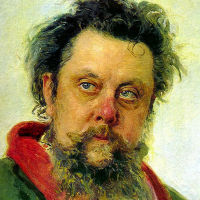| Handout (flat) Handout (folded) Class Script | Return to Index |
As of now, both the productions shown in class are available on YouTube—I was wrong saying they
weren't!—though in lesser quality than you would get by buying the DVD, and without English titles
(except, oddly, for the last two acts of Boris).
I have added Amazon links to buy the DVDs, both of which are reasonably priced for such long operas. I added
an old but classic video of Boris that does have titles, and a quite interesting modern-dress production
of the original 1869 version, though with titles in French.
I have supplemented these with a curiosity: a scene from Pushkin's original play of Boris Godunov as performed by the Royal Shakespeare Company in 2009—its first professional staging in English, believe it or not. The trailer looks more like a horror movie, but the interview with the director is well worth watching. The trailer for the Dutch Kitezh also contains interesting interviews with the director and lead singer. rb.
| PUSHKIN: BORIS | |||
| RSC 2009 |
* Trailer
(adapted by Adrian Mitchell) * Boris and his son (first part of death scene) * About the play (introduction by director Michael Boyd) |
||
| MUSSORGSKY: BORIS | |||
| St. Petersburg 1990 |
* Coronation scene
(as seen in class; with titles) * Prologue, Acts I and II (as seen in class; no titles) * Acts III and IV (as seen in class; with titles) * Buy DVD (Amazon link, about $20) |
||
| Bolshoi 1978 | * Complete opera (old video, but has titles) | ||
| St. Petersburg 2012 | * Complete opera (1869 version; French titles) | ||
| RIMSKY-KORSAKOV: KITEZH | |||
| Amsterdam 2012 |
* Trailer
(includes interview with director) * Prayer (short clip from commune scene) * Acts I and II (no titles) * Acts III and IV (no titles) * Buy DVD (Amazon link, about $27) |
||














